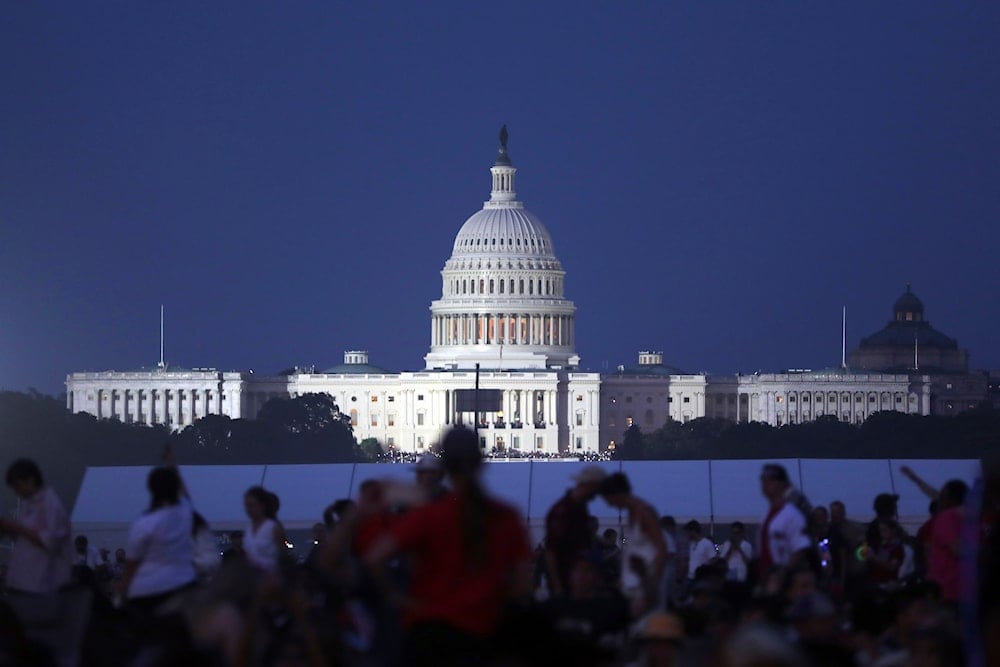Political 'diploma divide' now applies to Congress members: WP
A study spanning 50 years reveals a growing education divide in Congress, with Democrats holding Ivy League degrees while Republicans favor nonelite universities.
-

The US Capitol building stands as people wait to watch fireworks near the Washington Monument during Fourth of July celebrations, in Washington, on July 4, 2025. (AP)
A new study has found a stark Congress education divide, showing Democrats maintain strong ties to elite universities while Republicans overwhelmingly come from nonelite institutions.
The research, published by Cambridge University Press and conducted by scholars from the University of Arkansas, Vanderbilt University, and the University of Virginia, tracked 50 years of congressional education backgrounds. It found that almost half of Democrats in Congress today have an Ivy League or other elite university credential, while very few Republicans do.
In a sharp departure from the past, today’s GOP lawmakers largely attended nonelite universities for both undergraduate and postgraduate studies. Just 26% of current Senate Republicans have elite academic credentials, down from 55% in 1973. In the House, only 15% of Republicans hold such degrees.
Even leading Republicans who do have elite degrees tend to downplay them. President Donald Trump (University of Pennsylvania) and Vice President JD Vance (Yale Law School) have spearheaded GOP criticism of Ivy League institutions, accusing them of being "woke" and hostile to conservative values.
Senator Ted Cruz of Texas, a rare Republican with both Princeton and Harvard Law School credentials, frequently jokes about his background to conservative audiences: "As my father says, I’ve got a lot to apologize for."
Democrats with Ivy League degrees
In contrast, Democrats’ Ivy League degrees remain prevalent. Roughly half of all Democratic lawmakers hold credentials from elite institutions such as Harvard, Yale, or Stanford, a figure slightly higher than in the early 1970s.
Senator Richard Blumenthal (D-Connecticut), a Harvard graduate, noted the transformation of elite campuses, describing today’s student body as far more diverse than in the 1960s. Sen. Ruben Gallego (D-Arizona), the son of immigrants raised by a single mother, represents this shift in demographics at elite schools.
The study highlights how this shift unfolded over decades. In 1973, both parties had strong representation from elite universities: 55 percent of Senate Republicans and more than 40 percent of House Republicans held such credentials. By contrast, today’s numbers show a steep decline among Republicans.
For example, Yale once served as a feeder school for GOP senators, producing figures like George H.W. and George W. Bush. But no current Senate Republican has been a Yale undergraduate in more than 20 years.
Impact of diploma divide on US politics
This educational realignment mirrors broader voter trends known as the diploma divide in US politics. For at least 25 years, Americans without college degrees have leaned Republican, while college-educated voters have favored Democrats.
In presidential contests, the divide has sharpened. Donald Trump defeated Hillary Clinton by seven points among non-college voters in 2016; by 2024, his margin widened to 14 points against Vice President Kamala Harris. Meanwhile, Democrats won college-educated voters by double-digit margins.
The researchers argue that shared elite educational backgrounds once helped members of both parties build common networks and philosophical outlooks, making bipartisan cooperation easier. The decline of such overlap, they warn, may worsen polarization and hinder governance.
Craig Volden, Jonathan Wai, and Alan E. Wiseman, the study’s authors, wrote: "What are the implications of entering an era of two governing classes, divided by party and lacking common educational bonds, for governance, policymaking, and the future of American democracy?"
Republicans are now framing Democrats as the party of "rich coastal elites," while casting themselves as defenders of working-class America. Democrats, however, counter that GOP populism is undermined by billionaire donors and policies favoring corporations.

 4 Min Read
4 Min Read








